
The VPN that just worksThe VPN that just works
30-day money-back guarantee


The ExpressVPN Guarantee
Try ExpressVPN with zero commitment! If you’re not satisfied within the first 30 days, you’ll get your money back. All of it.
What is a VPN?


A VPN, or virtual private network, is a secure tunnel between your device and the internet. VPNs protect you from snooping, interference, and censorship.
As you connect to a secure VPN server, your internet traffic goes through an encrypted tunnel that nobody can see into—including hackers, governments, and your internet service provider.
How do I get and use a VPN?
Step 1

Sign up for ExpressVPN
Visit the order page and select the option that’s right for you. All of our plans are fully covered by our 30-day money-back guarantee.
Step 2
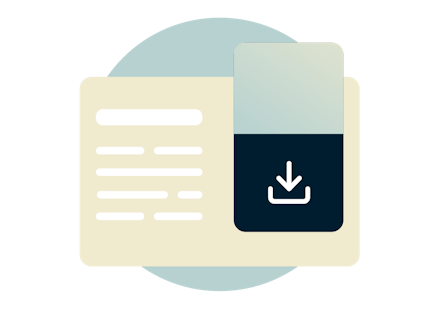
Download a VPN app
You’ll immediately be invited to download the VPN app for the device you’re using. Getting apps for all your other devices is just as easy.
Step 3
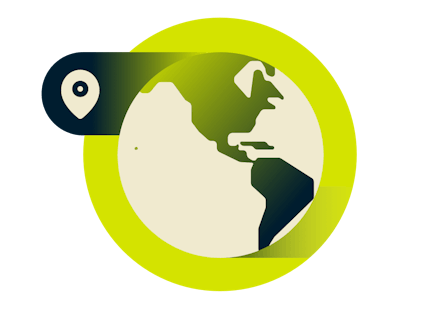
Connect to a VPN server location
Simply hit the On Button, and you’ll be instantly connected to the best location for your connection. Or pick one from our global network.
Why ExpressVPN?
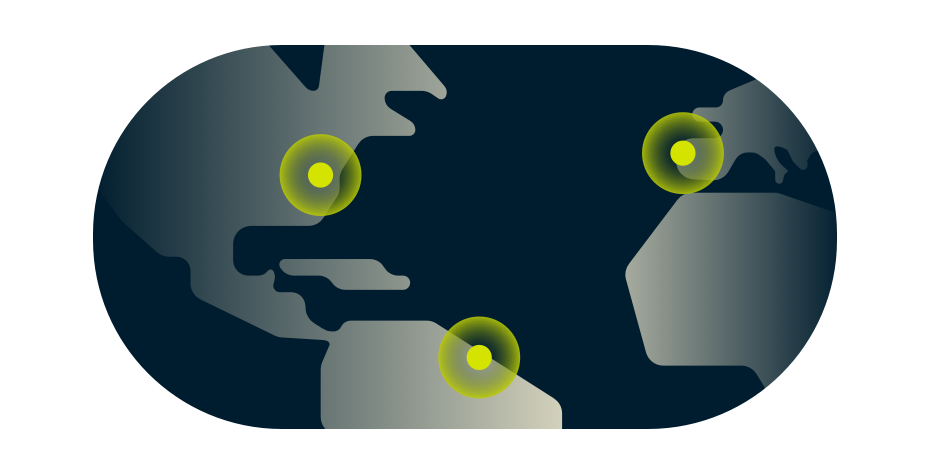
Servers in 105 countries
Appear to be anywhere in the world with our global fleet of VPN servers.
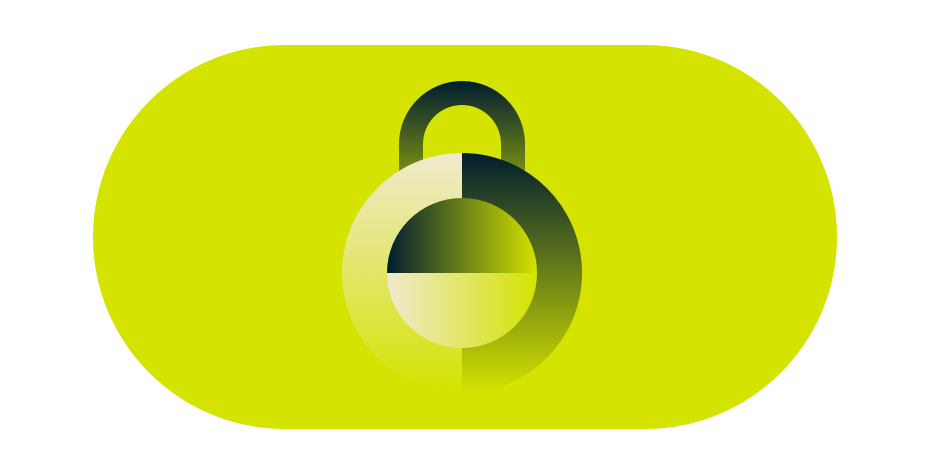
Best-in-class encryption
Your data is protected by AES-256, the standard trusted by security experts.

24-hour live chat support
Real humans are available 24/7 to help you with setup and troubleshooting.
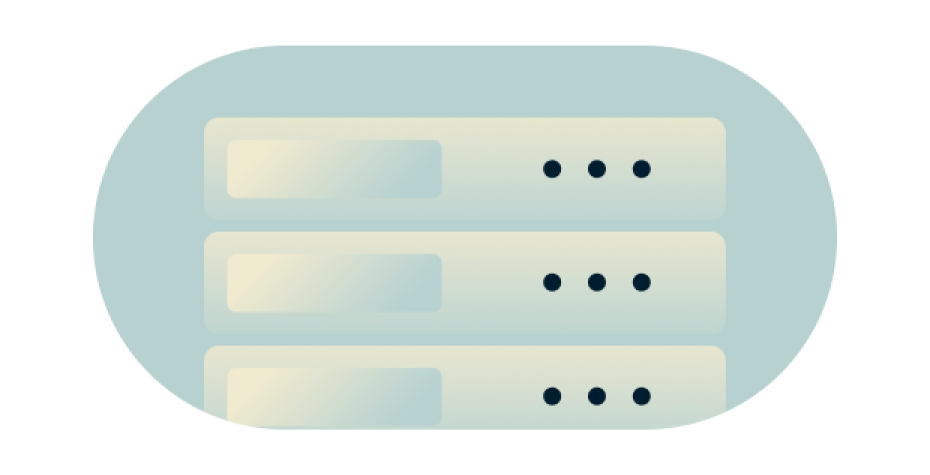
TrustedServer technology
With our innovative server technology, no data is ever written to a hard drive.

Lightning-fast speeds
Enjoy superior speeds anywhere. Find out why we’re named ExpressVPN.

Works on every platform
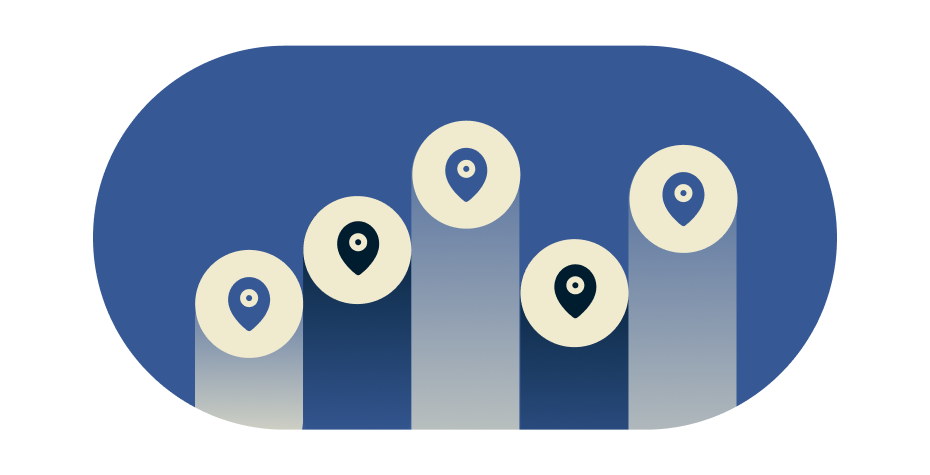
Use on up to 8 devices
Install ExpressVPN on all your devices, and connect up to eight at once.
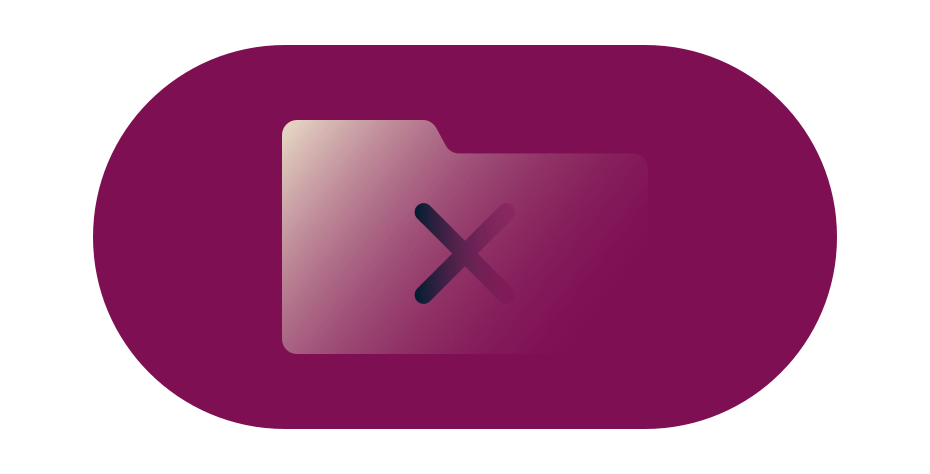
No activity logs
ExpressVPN never keeps data that could tie you to any online activity.

World’s #1 premium VPN
We’re crowned the Best VPN by CNET, TechRadar, The Verge, and more.
Ultra-fast servers around the globe
What people are saying about ExpressVPN


rated 4.7 out of 5


rated 4.4 out of 5
Excellent
I have ExpressVPN on all my devices - phone, laptop, tablet, AppleTV, etc., and absolutely love it.
TopherZ143

Great VPN!
A lot of comfort in knowing that my IP address is not known and not being watched.
king bishop

A sampling of reviews from our most satisfied customers. For all our reviews, check out the App Store or Google Play.
Got an account with @expressvpn yesterday. Great decision for traveling out of the country!

Dustin greiger
@D_Geiger
I have to say the service I have received from @expressvpn has been brilliant. Nothing is too much hassle so if you need a VPN I would consider Express.

ashbc
@BCoinChaos
I love express, in terms of security, speed and everything 👍

nima088
@Nill088
With its consistent performance and reliable security, ExpressVPN is the best VPN out there.

Practically everything about this service is top-tier and as a whole, ExpressVPN is quite simply one of the best VPNs right now.

Great all-around option for both beginner and experienced VPN users.

We sometimes pay expert sites to refer customers to us.
As seen in:






Benefits and advantages of VPN

Change your location
Using a VPN changes your IP address, the unique number that identifies you and where you are in the world. A new IP address makes it harder to determine your identity and real location. With ExpressVPN, you can appear to be in the UK, U.S., Canada, Australia, or any of 105 countries.

Protect your privacy
Changing your IP address with a VPN helps shield your identity from websites, apps, and services that want to track you. Good VPNs also prevent your internet provider, mobile carrier, and anyone else who may be listening from seeing your activity, thanks to a layer of strong encryption.

Increase your security
Using a VPN protects you from security breaches in many forms, including packet sniffing, rogue Wi-Fi networks, and man-in-the-middle attacks. Travelers, remote workers, and all kinds of on-the-go individuals use a VPN whenever they’re on an untrusted network like free public Wi-Fi.
When should I use a VPN?
If privacy is important to you, you should use a VPN every time you connect to the internet. A VPN app runs in the background of your device so it won’t get in the way while you use other apps and browse the internet. And you’ll have peace of mind knowing your privacy is always protected.
But here are some situations in which a VPN is especially useful:

While traveling
Exploring the world doesn’t mean you have to change the way you use the internet. A VPN lets you use the internet as if you were still in your home country, no matter how far you travel.

While having fun
A VPN lets you enjoy the sites and services you like without ISP throttling that could detract from your experience or outright blocking by your ISP or local Wi-Fi network.

While on public Wi-Fi
Connecting to public Wi-Fi hotspots like those in cafes, airports, and parks could leave your private information vulnerable. Using a VPN on your devices keeps you safe with strong encryption.

While gaming
Using a VPN unlocks games, maps, skins, and other add-ons that might be restricted on your network. It also shields you from DDoS attacks and reduces ping and overall lag.

While file-sharing
P2P file sharing usually means that strangers can see your IP address and possibly track your downloads. A VPN keeps your IP address private, letting you download with increased anonymity.

While shopping
Some online stores show different prices to people in different countries. With a VPN, you can find the best deals in the world no matter where you’re shopping from.
How does a VPN work?
To understand how a VPN works, it helps to first understand how your internet connection works without one.
Without a VPN
When you access a website without a VPN, you are being connected to that site through your internet service provider, or ISP. The ISP assigns you a unique IP address that can be used to identify you to the website. Because your ISP is handling and directing all your traffic, it can see which websites you visit. And your activity can be linked to you by that unique IP address.
With a VPN
When you connect to the internet with a VPN, the VPN app on your device (also called a VPN client) establishes a secure connection with a VPN server. Your traffic still passes through your ISP, but your ISP can no longer read it or see its final destination. The websites you visit can no longer see your original IP address, only the IP address of the VPN server, which is shared by many other users and changes regularly.
Not Connected
Connected
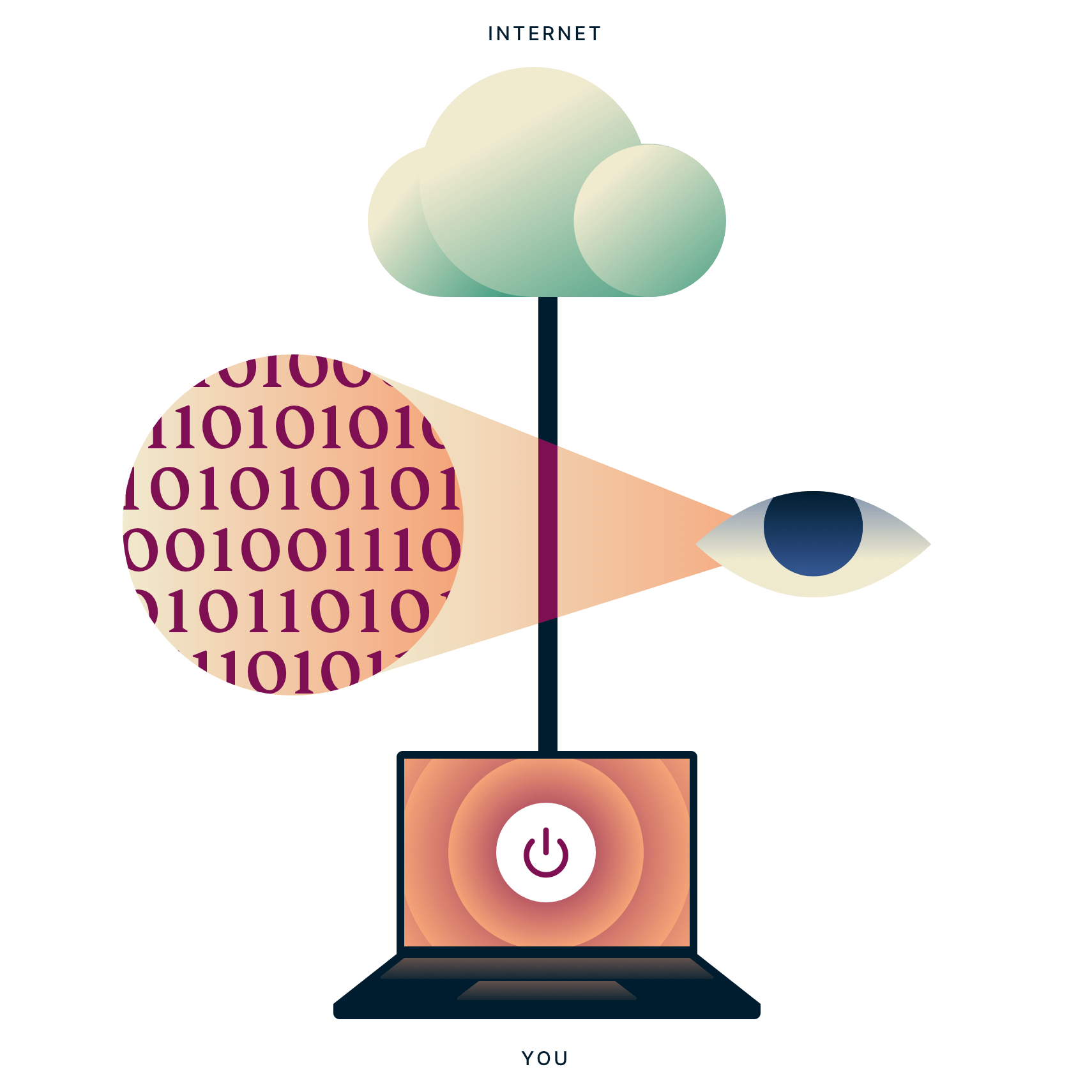

Here are several key concepts related to VPN that will help you understand how a VPN works and the benefits it provides:
Proxying
The VPN server acts like a proxy, or stand-in, for your web activity: Instead of your real IP address and location, websites you visit will only see the IP address and location of the VPN server.
This makes you more anonymous on the internet.
Authentication
Establishing a secure connection is a tricky problem solved by clever mathematics in a process called authentication.
Once authenticated, the VPN client and VPN server can be sure they are talking to each other and no one else.
Tunneling
VPNs also protect the connection between client and server with tunneling and encryption.
Tunneling is a process by which each data packet is encapsulated inside another data packet. This makes it harder for third parties to read in transit.
Encryption
Data inside the tunnel is also encrypted in such a way that only the intended recipient can decrypt it. This keeps the contents of your internet traffic completely private. Even your internet service provider won’t see it.
VPN protocols
VPN protocols are the methods by which your device connects to the VPN server. Some protocols are better for speed, some are better for security, and some simply work better under certain network conditions.
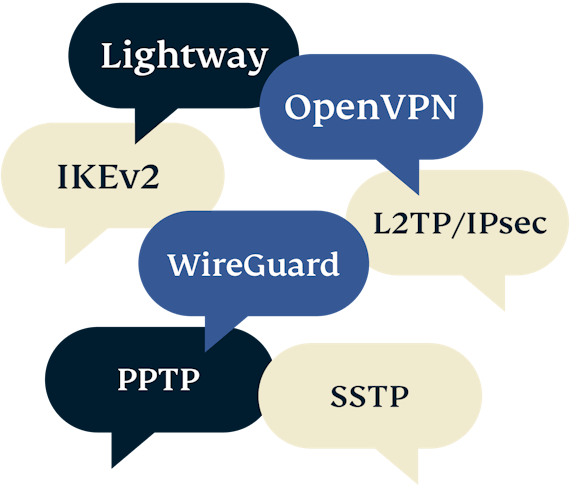
Most VPNs use a standard set of protocols, but ExpressVPN built Lightway to outdo them all in speed, reliability, and security. Give it a try to see for yourself. Learn more about Lightway.
ExpressVPN automatically chooses the best protocol for your network, but you can also choose one manually.
Popular VPN protocols in use today include:
PPTP *
SSTP*
*Not supported by ExpressVPN.
Types of VPN

Commercial VPN
A commercial VPN, also called a personal VPN or a consumer VPN, is a private service offered directly to individuals, usually for a fee.
ExpressVPN is such a VPN service because it directly caters to the privacy needs of its customers.

Corporate VPN
A corporate VPN, also called a business VPN, allows an organization’s remote employees to connect securely to the internet as if they were physically present in the office.
Unlike commercial VPNs, however, corporate VPNs are meant to protect the privacy of the company and not necessarily the individual.

Self-setup VPN
Some tech experts and DIY hobbyists choose to set up their own VPN using their own equipment.
Self-setup VPNs, however, do not provide the protection of shared IP addresses, server locations in multiple countries, or many other features enjoyed by commercial VPN users.
Alternatives to VPN
A VPN isn’t the only tool that can increase your privacy, security, and/or freedom online.
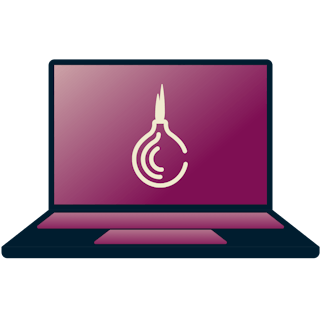
Tor
Tor (short for The Onion Router) is a free network of servers, or “nodes,” that randomly route internet traffic between each other in order to obfuscate the origin of the data.
Using Tor can significantly increase your anonymity, and using Tor in conjunction with a VPN creates the best possible privacy protection.
The biggest drawback of Tor, however, is speed. Because your traffic is relayed through several hops, you will probably find it inconvenient to download or file-share with Tor.

Proxy services
A proxy server is any intermediary between your device and the internet. Unlike a VPN, however, most “proxy services” you’ll find are quite slow and don’t offer any privacy or security benefits.
So-called “free proxy services” are especially dangerous, as many will find other ways to monetize your data, like selling it to third parties.
Neither Tor nor a proxy service can replace the benefits of a VPN. A trustworthy VPN is still the best privacy solution for most people.
FAQ
The most important quality to consider when choosing a VPN service is trust. A trustworthy VPN provider:
-
is transparent in its privacy policy
-
has been independently audited
-
designs its systems to avoid storing personal data
-
shows a consistent commitment to internet privacy and digital freedom
Thereafter, choose your VPN based on the features you need, such as VPN server locations, compatibility with all the devices you own, and unlimited bandwidth.
It’s hard for a free VPN to match the features and service of a quality paid provider. With free VPNs, you are more likely to experience slow connections bogged down by a flood of users on suboptimal networks, no customer support, weak security, and a small number of VPN server locations to choose from.
As a premium paid provider, ExpressVPN can offer connections optimized for speed, security, and stability, as well as a wide selection of server locations in 105 countries around the world. Plus, our dedicated Support Team is available 24/7 to help.
VPNs are legal, and they are consistently used by individuals and companies around the world to protect their private information and online activity, including in countries with highly restrictive governments. Even where VPNs are seen as discouraged, many governments tacitly endorse their use by officials, academics, or business leaders as a necessary measure to stay competitive in an interconnected world. It is not practical for any country to ban all VPNs.
Having said that, illegal online activity remains illegal, whether you are using a VPN or not.
With apps for iOS and Android, ExpressVPN is easy to use on mobile devices. As more of our digital activity—including banking, streaming, and messaging—happens on our phones and tablets, it is becoming more important to safeguard our data with a VPN on these devices, especially when using public Wi-Fi.
VPNs have the potential to slow your internet connection, but ExpressVPN’s industry-leading speeds mean users rarely notice a difference. In fact, use of a VPN may actually improve your connection if your ISP has been throttling your traffic.
In any case, if you do notice that your connection has slowed down, try selecting a server location that is geographically closer to you.
Like all apps, a VPN will consume some amount of power on your device. That’s one reason ExpressVPN developed Lightway, our exclusive, custom-built new VPN protocol, which is designed to use significantly less battery than other protocols. It’s also faster and easier to audit and maintain.
ExpressVPN believes everyone has a right to privacy. When you connect to our network, strong encryption prevents your activity from being observed by your internet provider, Wi-Fi operators, or other third parties. ExpressVPN collects no activity or connection logs, and our groundbreaking TrustedServer technology ensures that no data is ever stored on any server. In short, no specific network activity or behavior can be traced to any ExpressVPN user.
Using a VPN is not only safe, it can add a valuable layer of security to your online banking, especially on public Wi-Fi networks. And because some financial institutions will suspend access to users who appear to be visiting from somewhere unexpected, connecting to a server location in your home country before you log in to your bank or PayPal account can save you from getting locked out.
We recommend that you keep ExpressVPN on anytime your device is connected to the internet, even if you’re not actively using it. By leaving the app running in the background, you’ll have peace of mind knowing that your privacy is always protected.
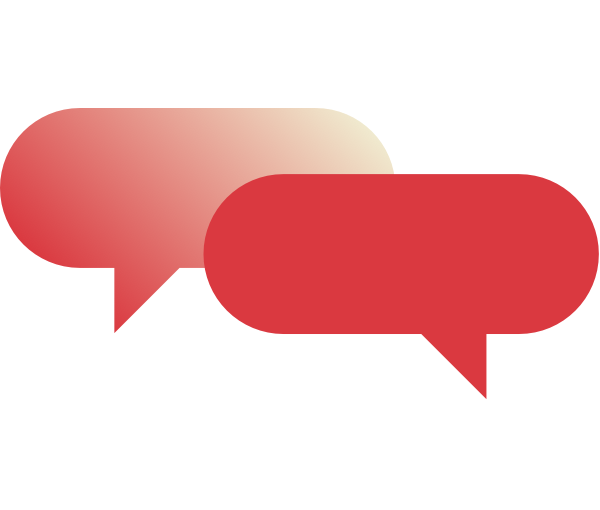
Live, 24-hour customer support
Real support from real people. We’re available through instant live chat and email to help you set up and troubleshoot.

30-day money-back guarantee
Our VPN is easy to use. So is our guarantee. If you’re not satisfied, we’ll refund your payment. No hassle, no risk.
30-day money-back guarantee